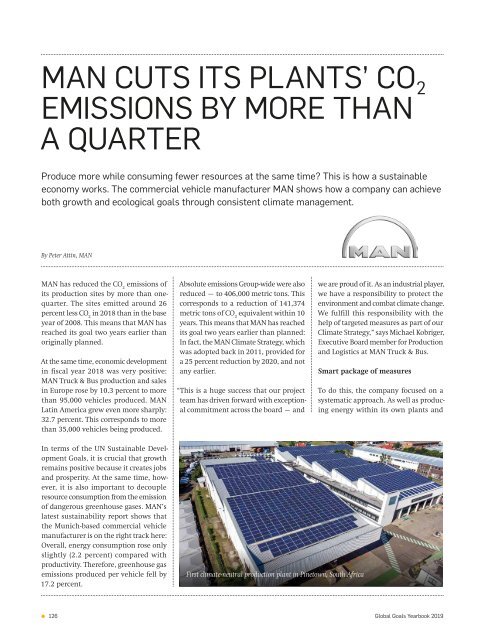Aliging Profit with Purpose - Global Goals Yearbook 2019
What are companies for? The rules for companies have changed. The focus is increasingly on their sustainable, social, and ecological impacts. The strategic orientation toward the so-called corporate purpose is decisive for profitable growth in the future. This currently results in a large number of questions for businesses: How do you find an inspiring and future-oriented corporate purpose, and how can it be aligned in such a way that it brings profitable growth and social responsibility in concert? The new 2019 edition of the Global Goals Yearbook offers answers to these crucial questions thanks to its consistent orientation toward the UN Sustainable Development Goals and a competent editorial board and author pool.
What are companies for? The rules for companies have changed. The focus is increasingly on their sustainable, social, and ecological impacts. The strategic orientation toward the so-called corporate purpose is decisive for profitable growth in the future.
This currently results in a large number of questions for businesses: How do you find an inspiring and future-oriented corporate purpose, and how can it be aligned in such a way that it brings profitable growth and social responsibility in concert? The new 2019 edition of the Global Goals Yearbook offers answers to these crucial questions thanks to its consistent orientation toward the UN Sustainable Development Goals and a competent editorial board and author pool.
Create successful ePaper yourself
Turn your PDF publications into a flip-book with our unique Google optimized e-Paper software.
MAN CUTS ITS PLANTS’ CO 2<br />
EMISSIONS BY MORE THAN<br />
A QUARTER<br />
Produce more while consuming fewer resources at the same time? This is how a sustainable<br />
economy works. The commercial vehicle manufacturer MAN shows how a company can achieve<br />
both growth and ecological goals through consistent climate management.<br />
By Peter Attin, MAN<br />
MAN has reduced the CO 2<br />
emissions of<br />
its production sites by more than onequarter.<br />
The sites emitted around 26<br />
percent less CO 2<br />
in 2018 than in the base<br />
year of 2008. This means that MAN has<br />
reached its goal two years earlier than<br />
originally planned.<br />
At the same time, economic development<br />
in fiscal year 2018 was very positive:<br />
MAN Truck & Bus production and sales<br />
in Europe rose by 10.3 percent to more<br />
than 95,000 vehicles produced. MAN<br />
Latin America grew even more sharply:<br />
32.7 percent. This corresponds to more<br />
than 35,000 vehicles being produced.<br />
Absolute emissions Group-wide were also<br />
reduced – to 406,000 metric tons. This<br />
corresponds to a reduction of 141,374<br />
metric tons of CO 2<br />
equivalent <strong>with</strong>in 10<br />
years. This means that MAN has reached<br />
its goal two years earlier than planned:<br />
In fact, the MAN Climate Strategy, which<br />
was adopted back in 2011, provided for<br />
a 25 percent reduction by 2020, and not<br />
any earlier.<br />
“This is a huge success that our project<br />
team has driven forward <strong>with</strong> exceptional<br />
commitment across the board – and<br />
we are proud of it. As an industrial player,<br />
we have a responsibility to protect the<br />
environment and combat climate change.<br />
We fulfill this responsibility <strong>with</strong> the<br />
help of targeted measures as part of our<br />
Climate Strategy,” says Michael Kobriger,<br />
Executive Board member for Production<br />
and Logistics at MAN Truck & Bus.<br />
Smart package of measures<br />
To do this, the company focused on a<br />
systematic approach. As well as producing<br />
energy <strong>with</strong>in its own plants and<br />
In terms of the UN Sustainable Development<br />
<strong>Goals</strong>, it is crucial that growth<br />
remains positive because it creates jobs<br />
and prosperity. At the same time, however,<br />
it is also important to decouple<br />
resource consumption from the emission<br />
of dangerous greenhouse gases. MAN’s<br />
latest sustainability report shows that<br />
the Munich-based commercial vehicle<br />
manufacturer is on the right track here:<br />
Overall, energy consumption rose only<br />
slightly (2.2 percent) compared <strong>with</strong><br />
productivity. Therefore, greenhouse gas<br />
emissions produced per vehicle fell by<br />
17.2 percent.<br />
First climate-neutral production plant in Pinetown, South Africa<br />
126<br />
<strong>Global</strong> <strong>Goals</strong> <strong>Yearbook</strong> <strong>2019</strong>

















